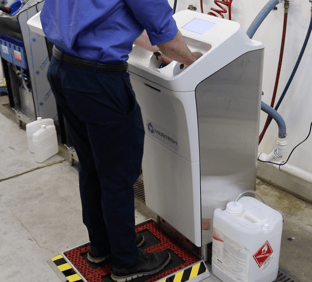How Can a Hand Hygiene Monitoring System Ensure Food Safety?
Maintaining proper hand hygiene is crucial for upholding food safety standards, and incorporating a hand hygiene monitoring system can greatly contribute to achieving excellence in food handling and preparation. Whether it involves actively monitoring hand hygiene compliance or utilizing advanced technology to ensure adherence to hygiene protocols, it is essential to prioritize staff commitment to hand hygiene for the sake of food safety. Here are the top reasons why you should implement a hand hygiene monitoring system:
1. Using hand hygiene monitoring systems help to proactively prevent foodborne illnesses
 Contaminated hands of food handlers are a common source of foodborne pathogens.Most people do not actively think about washing their hands correctly causing critical steps to be missed. Effective hand hygiene practices, such as proper handwashing with soap and water, can significantly reduce the risk of transferring harmful bacteria, viruses, or other contaminants to food.
Contaminated hands of food handlers are a common source of foodborne pathogens.Most people do not actively think about washing their hands correctly causing critical steps to be missed. Effective hand hygiene practices, such as proper handwashing with soap and water, can significantly reduce the risk of transferring harmful bacteria, viruses, or other contaminants to food.
A monitoring system ensures that employees adhere to established hand hygiene protocols, minimizing the potential for foodborne illnesses. This can be a manual check by peers, achieved by putting a food safety culture in place or through policing the behavior. Or Automated Hygiene Equipment can be used to track compliance. CleanTech® Automated handwashing stations standardize the hygiene process and track each hand wash so you can ensure you team is always compliant.
Learn how to utilize food safety culture training resources
2. Uphold product quality and consumer trust with hand hygiene monitoring systems.
Maintaining proper hand hygiene is essential for preserving the quality of food products. When hands are not properly cleaned, cross-contamination can occur, leading to the growth of spoilage organisms that can negatively impact the taste, appearance, and overall quality of food. By implementing a hand hygiene monitoring system, food establishments demonstrate their commitment to upholding high standards of cleanliness and safety, which in turn instills consumer confidence, enhances brand reputation, and fosters customer loyalty. Consumers today are more informed and concerned about food safety, and by prioritizing hand hygiene, food establishments can ensure that they are meeting the expectations of their customers and maintaining a safe and hygienic environment.
3. Ensure compliance with hand washing standards and regulations with a hygiene monitoring system
 Without a manual or automated hand hygiene monitoring system in place, it is impossible to ensure that every individual is properly washing their hands before handling food items. By incorporating a monitoring system, food establishments showcase their commitment to meeting regulatory standards and ensuring the highest levels of cleanliness and safety. This reinforces their reputation for upholding exceptional hygiene practices and further establishes their dedication to providing a safe and enjoyable dining experience.
Without a manual or automated hand hygiene monitoring system in place, it is impossible to ensure that every individual is properly washing their hands before handling food items. By incorporating a monitoring system, food establishments showcase their commitment to meeting regulatory standards and ensuring the highest levels of cleanliness and safety. This reinforces their reputation for upholding exceptional hygiene practices and further establishes their dedication to providing a safe and enjoyable dining experience.
Learn how CleanTech® helps to ensure proper compliance
4. Monitoring systems makes training easier and holds employee accountable to upholding good hand hygiene
 A hand hygiene monitoring system fosters a sense of responsibility and accountability among employees as it tracks and documents their hand hygiene practices. This system empowers managers to identify areas for improvement, provide targeted training, and reinforce proper hand hygiene protocols. Through regular monitoring and feedback, a culture of responsibility and continuous improvement is cultivated within the workforce.
A hand hygiene monitoring system fosters a sense of responsibility and accountability among employees as it tracks and documents their hand hygiene practices. This system empowers managers to identify areas for improvement, provide targeted training, and reinforce proper hand hygiene protocols. Through regular monitoring and feedback, a culture of responsibility and continuous improvement is cultivated within the workforce.
In the unfortunate event of a foodborne illness outbreak linked to a specific establishment, a hand hygiene monitoring system proves invaluable in swiftly identifying potential sources of contamination. By promptly reviewing hand hygiene records, management can take necessary actions to retrain staff as required, effectively preventing further spread of pathogens.
Overall, a manual or automated hand hygiene monitoring system is essential for upholding food safety standards, preventing contamination, meeting regulations, and ensuring customer satisfaction.






